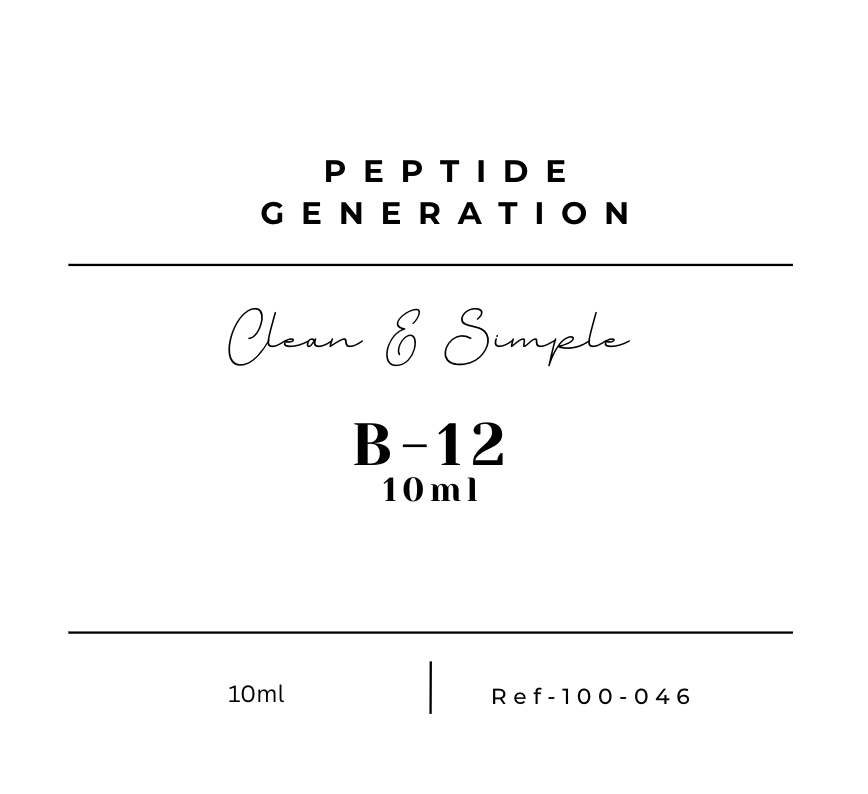 Image 1 of 1
Image 1 of 1


B-12
🔬 What Is B-12?
Vitamin B-12 is a water-soluble vitamin essential for:
Red blood cell formation (prevents anemia)
DNA synthesis
Nervous system health (protects myelin sheath)
Energy metabolism (helps convert food into usable cellular energy)
Natural sources: animal products (meat, fish, eggs, dairy).
Deficiency is more common in: vegans/vegetarians, older adults, people with GI absorption issues, and those on certain medications (like metformin or PPIs).
📌 Health Benefits
Prevents and treats pernicious anemia and other B-12 deficiencies.
May improve energy levels, mood, and cognitive function in deficient individuals.
Supports nerve repair and protection.
Plays a role in heart health by lowering homocysteine levels (though benefits here are mixed).
💉 Forms & Dosing
Vitamin B-12 is available in different forms:
Cyanocobalamin – most common, synthetic, effective but requires conversion in the body.
Methylcobalamin – bioactive form, often preferred for nervous system support.
Hydroxocobalamin – longer-acting, often used in clinical injections.
Supplementation Options
Oral: 250 mcg – 1,000 mcg daily (over-the-counter tablets, lozenges, or gummies).
Sublingual: absorbed under the tongue, often 1,000 mcg daily.
Injections (IM or subQ):
Common deficiency treatment: 1,000 mcg daily for 1 week → weekly for 4 weeks → monthly maintenance.
Wellness/energy protocols: 1,000 mcg once weekly or every 2–4 weeks, depending on provider.
⚠️ Safety
Very safe, as excess B-12 is excreted in urine.
Rare side effects: mild diarrhea, itching, or injection site soreness.
No established upper intake limit—well tolerated even at high doses.
✅ Key Takeaways
B-12 is essential for red blood cells, nerve function, and energy metabolism.
Deficiency can cause anemia, fatigue, neuropathy, and cognitive changes.
Supplementation: oral (daily) or injectable (weekly to monthly), depending on needs.
Safe and well tolerated, especially important for at-risk groups (vegans, elderly, malabsorption conditions).
🔬 What Is B-12?
Vitamin B-12 is a water-soluble vitamin essential for:
Red blood cell formation (prevents anemia)
DNA synthesis
Nervous system health (protects myelin sheath)
Energy metabolism (helps convert food into usable cellular energy)
Natural sources: animal products (meat, fish, eggs, dairy).
Deficiency is more common in: vegans/vegetarians, older adults, people with GI absorption issues, and those on certain medications (like metformin or PPIs).
📌 Health Benefits
Prevents and treats pernicious anemia and other B-12 deficiencies.
May improve energy levels, mood, and cognitive function in deficient individuals.
Supports nerve repair and protection.
Plays a role in heart health by lowering homocysteine levels (though benefits here are mixed).
💉 Forms & Dosing
Vitamin B-12 is available in different forms:
Cyanocobalamin – most common, synthetic, effective but requires conversion in the body.
Methylcobalamin – bioactive form, often preferred for nervous system support.
Hydroxocobalamin – longer-acting, often used in clinical injections.
Supplementation Options
Oral: 250 mcg – 1,000 mcg daily (over-the-counter tablets, lozenges, or gummies).
Sublingual: absorbed under the tongue, often 1,000 mcg daily.
Injections (IM or subQ):
Common deficiency treatment: 1,000 mcg daily for 1 week → weekly for 4 weeks → monthly maintenance.
Wellness/energy protocols: 1,000 mcg once weekly or every 2–4 weeks, depending on provider.
⚠️ Safety
Very safe, as excess B-12 is excreted in urine.
Rare side effects: mild diarrhea, itching, or injection site soreness.
No established upper intake limit—well tolerated even at high doses.
✅ Key Takeaways
B-12 is essential for red blood cells, nerve function, and energy metabolism.
Deficiency can cause anemia, fatigue, neuropathy, and cognitive changes.
Supplementation: oral (daily) or injectable (weekly to monthly), depending on needs.
Safe and well tolerated, especially important for at-risk groups (vegans, elderly, malabsorption conditions).

